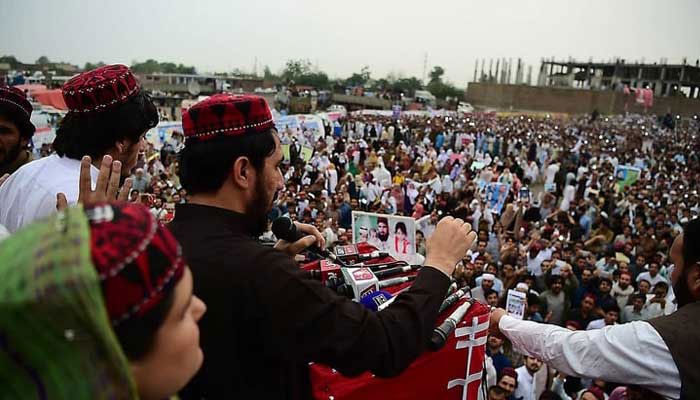Ban first, think later
Authorities claim PTM poses threats to national security, and alleged that group may be in cahoots with TTP
The government’s decision to ban the Pashtun Tahaffuz Movement (PTM) is unsurprising given the history of state responses to the movement since it became mainstream in 2018. Authorities claim that the PTM now poses significant threats to national security, and have now alleged that the group may be in cahoots with the Taliban. All this comes as claims made after the group was banned. It is this lack of transparency that raises serious questions about the rationale behind the ban. In a country already grappling with deep political instability, unsubstantiated accusations only fan the flames of division. What cannot be denied, however, is that the state is facing a volatile and polarized political climate, where public anger has reached unprecedented levels. Events like the May 9 protests showed how dangerously blurred the red lines of dissent have become, perhaps leading the state to take preemptive action against any potential civil unrest. The PTM has long been a vocal critic of the state’s policies in regions worst affected by the war on terror. By banning the movement, the government may feel it is preventing the rise of another wave of anti-state sentiment. However, reactionary decisions without transparency undermine the very stability the government seeks to preserve.
In an atmosphere where political and social polarization has reached critical levels, withholding information is more dangerous. And ignoring legitimate grievances of marginalized groups is also a disservice to the country. This is a region that bore the brunt of the war on terror, where thousands of civilians lost their lives, properties were destroyed, and entire communities were displaced. This was all bound to lead to some efforts to demand rights. Instead of addressing these grievances, the state has unfortunately opted to suppress the movement that amplifies them.
The fact is that bans end up eroding public trust even more which leads to blurring important red lines. It must be emphasized though that no one – social movement, political party, peaceful civil rights movement – has any carte blanche to disrupt national stability. There are no winners in violence, and destabilizing Pakistan will only make it vulnerable to external threats. The key, then, is dialogue – real, honest dialogue that addresses the root causes of grievances, from disenfranchisement to armed action to resource allocation. The state must understand that suppressing dissent is a short-term solution at best. The real work lies in creating an environment where citizens feel heard and their grievances are addressed. Openness and communication are essential to mending the trust between the government and marginalized groups. Only then can Pakistan hope to move forward without further alienating its citizens or, worse, pushing them into the arms of extremism. The state’s primary role is to protect its people, but protection cannot come at the cost of their civil rights. As for movements, marginalized and otherwise, there is no excuse for lack of transparency there either. Nothing would ever justify any kind of shady shadows on people’s rights movements. Which is why, where it is essential that the state rethink its approach, it is also essential that any civil rights movement also ensures it is upfront about its alliances, funding, measures and ideologies.
-
 Jennifer Hudson Gets Candid About Kelly Clarkson Calling It Day From Her Show
Jennifer Hudson Gets Candid About Kelly Clarkson Calling It Day From Her Show -
 Shamed Andrew Was With Jeffrey Epstein Night Of Virginia Giuffre Assault
Shamed Andrew Was With Jeffrey Epstein Night Of Virginia Giuffre Assault -
 Shamed Andrew’s Finances Predicted As King ‘will Not Leave Him Alone’
Shamed Andrew’s Finances Predicted As King ‘will Not Leave Him Alone’ -
 Bad Bunny Faces Major Rumour About Personal Life Ahead Of Super Bowl Performance
Bad Bunny Faces Major Rumour About Personal Life Ahead Of Super Bowl Performance -
 Sarah Ferguson’s Links To Jeffrey Epstein Get More Entangled As Expert Talks Of A Testimony Call
Sarah Ferguson’s Links To Jeffrey Epstein Get More Entangled As Expert Talks Of A Testimony Call -
 France Opens Probe Against Former Minister Lang After Epstein File Dump
France Opens Probe Against Former Minister Lang After Epstein File Dump -
 Last Part Of Lil Jon Statement On Son's Death Melts Hearts, Police Suggest Mental Health Issues
Last Part Of Lil Jon Statement On Son's Death Melts Hearts, Police Suggest Mental Health Issues -
 Leonardo DiCaprio's Girlfriend Vittoria Ceretti Given 'greatest Honor Of Her Life'
Leonardo DiCaprio's Girlfriend Vittoria Ceretti Given 'greatest Honor Of Her Life' -
 Beatrice, Eugenie’s Reaction Comes Out After Epstein Files Expose Their Personal Lives Even More
Beatrice, Eugenie’s Reaction Comes Out After Epstein Files Expose Their Personal Lives Even More -
 Will Smith Couldn't Make This Dog Part Of His Family: Here's Why
Will Smith Couldn't Make This Dog Part Of His Family: Here's Why -
 Kylie Jenner In Full Nesting Mode With Timothee Chalamet: ‘Pregnancy No Surprise Now’
Kylie Jenner In Full Nesting Mode With Timothee Chalamet: ‘Pregnancy No Surprise Now’ -
 Laura Dern Reflects On Being Rejected Due To Something She Can't Help
Laura Dern Reflects On Being Rejected Due To Something She Can't Help -
 HBO Axed Naomi Watts's 'Game Of Thrones' Sequel For This Reason
HBO Axed Naomi Watts's 'Game Of Thrones' Sequel For This Reason -
 King Charles' Sandringham Estate Gets 'public Safety Message' After Andrew Move
King Charles' Sandringham Estate Gets 'public Safety Message' After Andrew Move -
 Lewis Capaldi Sends Taylor Swift Sweet Message After 'Opalite' Video Role
Lewis Capaldi Sends Taylor Swift Sweet Message After 'Opalite' Video Role -
 Brooklyn Beckham Plunges Victoria, David Beckham Into Marital Woes: ‘They’re Exhausted As It Seeps Into Marriage
Brooklyn Beckham Plunges Victoria, David Beckham Into Marital Woes: ‘They’re Exhausted As It Seeps Into Marriage




